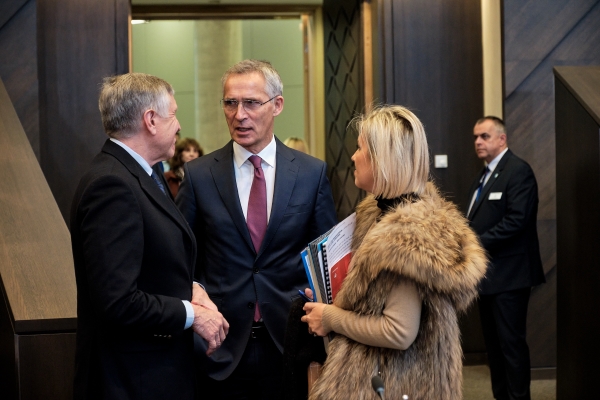 (L-R) François Bausch, Luxembourg's Deputy Prime Minister, Minister of Defence; Jens Stoltenberg, Secretary General of NATO; Ludivine Dedonder, Minister of Defence of Belgium;
Credit: NATO
(L-R) François Bausch, Luxembourg's Deputy Prime Minister, Minister of Defence; Jens Stoltenberg, Secretary General of NATO; Ludivine Dedonder, Minister of Defence of Belgium;
Credit: NATO
On Thursday 13 October 2022, Luxembourg's Deputy Prime Minister and Minister of Defence, François Bausch, participated in the meeting of NATO Defence Ministers, which took place in Brussels, Belgium.
At the long-planned first meeting of NATO's Nuclear Planning Group, Defence Ministers discussed the Alliance's deterrent capabilities. These discussions have recently taken on particular importance due to the threats articulated by Russia.
The second meeting focused on NATO's deterrence and defence posture, particularly in view of recent developments in the Russian war of aggression in Ukraine. Defence Minister Bausch reaffirmed Luxembourg's support for Ukraine and the importance of recalibrating the deterrence and defence posture in the face of Russia's aggressive posture. Minister Bausch also underlined that NATO should provide a proportional response to threats, while avoiding excesses and focusing on specific objectives to be achieved at the level of the Alliance's common capabilities.
Regarding the defence budgets of the allies, Minister Bausch explained that Luxembourg will substantially strengthen its effort, doubling the defence effort by 2028. Luxembourg defence will invest in cutting-edge capabilities for the benefit of the Alliance, especially in the areas of space, cyberspace, emerging technologies and climate change risks. Minister Bausch raised the issue of the 2% spending target: “I defend myself against the obsession with 2%. We must first set objectives to be achieved at the capability level, distribute as we are already doing now these efforts among the allies and then define the financial level necessary at the national level to achieve these objectives. The 2% is not an end in itself and is not adapted to the particular situation of my country.”
The latest meeting of NATO Defence Ministers, also attended by the High Representative of the European Union (EU) for Foreign Affairs and Security Policy, Josep Borrell, focused on the missions and operations of NATO and the EU as well as EU-NATO defence interaction. During his speech, Minister Bausch insisted that regular and close exchanges between the EU and NATO are essential for collective security and that efforts to prevent and manage the crisis must be continued.
With regard to the KFOR mission in Kosovo, Minister Bausch underlined the importance of this mission and confirmed that Luxembourg will continue its financial contribution to the role 2 hospital for KFOR, a critical capability in the context mission medical support. In Iraq, Luxembourg will continue to support the NMI mission (NATO Mission Iraq) by providing satellite communication equipment and personnel. Finally, regarding a future military assistance mission in Ukraine (EUMAM Ukraine), Minister Bausch said: "Luxembourg continues its lethal and non-lethal support to help Ukraine in its fight against the Russian invasion and we generally support the idea of an EUMAM mission in Ukraine.”








